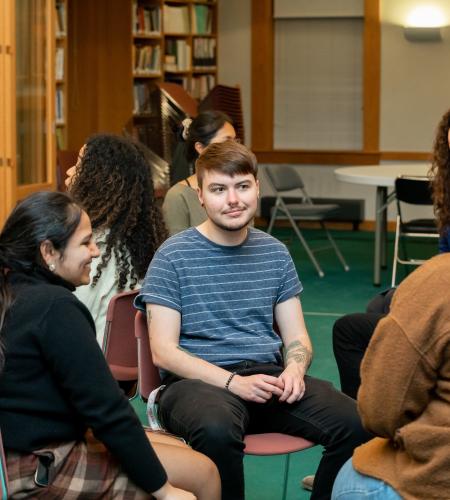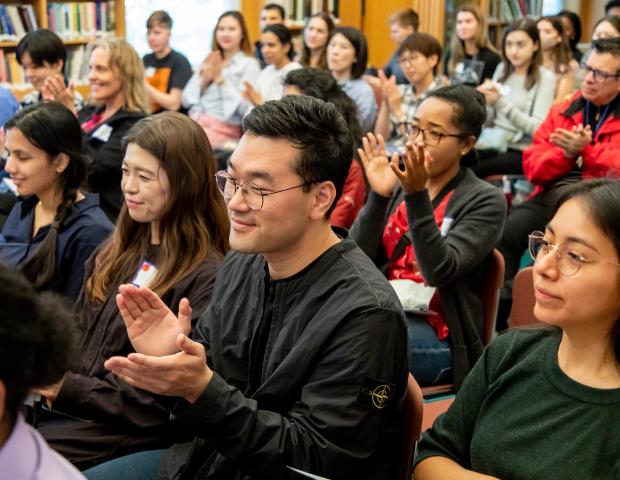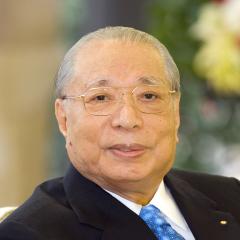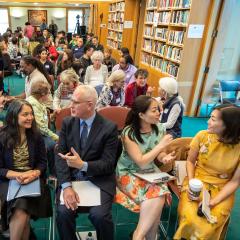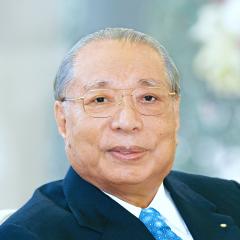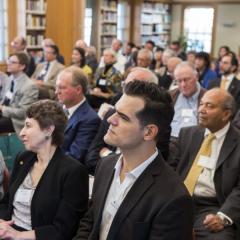To commemorate our 30th anniversary and the 19th Annual Ikeda Forum for Intercultural Dialogue, Center founder Daisaku Ikeda composed this message extolling the power of literature to help the “human spirit take flight.” In so doing, literature enables us to marshal the inner resources to heal the divisions plaguing society today.
Daisaku Ikeda Message
I proudly commend the Ikeda Center for Peace, Learning, and Dialogue for striving to create constructive new value through the persistent engagement of dialogue for the past 30 years, a period rife with uncertainty and tectonic change spanning the previous and present centuries.
Allow me also to express my heartfelt appreciation to the eminent scholars and many others who have been generous, resilient and thoughtful friends of the Center over the years. I thank each of you for your support, both public and private, and for continually encouraging the Center as it has grown and matured.
I am writing this to express, as if I were there in person, my profound gratitude to all of you who have gathered today for your participation. And to our panelists: Each of you is an authority in your respective discipline, and your presence makes this commemorative Forum shine with even greater significance. You have my deepest respect.
Wherein lies the fundamental cause of a world caught in the ever-escalating throes of division and conflict? A passage from Mahayana Buddhism offers an answer:
When a nation becomes disordered, it is the spirits that first show signs of rampancy. Because the spirits become rampant, all the people of the nation become disordered. (1)
The “spirits” as cited here are the equivalents of the modern ideologies and spiritual states that turn demonic in the minds of individuals, with ramifications crippling enough to undermine society itself and bring ruin to a country.
Thus, the very first step we need to take in this most trying of times, when adversity strikes so often and without relent as to make us falter in our very tracks, is quite clear. And that step is what the flagbearers of the 19th-century American Renaissance called out to us to do: To first turn our gaze inward, into the depths of our own lives, in order to give dynamic expression to the inner transformation of oneself. There is no other recourse but to do so.
This brings to mind an entry in Emerson’s journal, which includes the following exhortation:
Trust your nature, the common mind; fear not to sound its depths, to ejaculate its grander emotions. (2)
The existence of a single individual is never to be trifled with. Unfolding boundlessly within the deepest strata of human life lies what can be described as the “universal self,” an expansive capacity so sublime, so august, as to be without peer. I have found that it is literature, above all, that provides the wings with which such human spirit takes flight into this infinite realm.
In the early postwar years, my mentor in life, Josei Toda, employed literary masterpieces of the world to inspire and tutor me and other youth under his care. While sharing in our perspectives on the universality of life, a dimension so vast as to transcend the ages and nation-states, race and religion, Mr. Toda further opened our minds to a new vision of the means of uniting humanity in harmony: the principles of “human revolution” and “global citizenship.”
In the years that followed, as a protégé embracing Mr. Toda’s vision as my own, I set out on a journey across the world in the hope of bringing countries closer together. In doing so, I also sought to draw lessons from the finest literature of each country and share the deep emotions they evoked. For I firmly believe this evocative capacity of literature intimately resonates with the “dialogues of the heart” that nurture an inner transformation of our lives and the spirit of peace.
Such a dialogue animated by literature’s power will have a particularly inestimable impact on the lives of this and other generations to come, whom I see as emissaries of the future. When I met with Dr. Wangari Maathai, she told me of a childhood recollection that came about from an unforgettable conversation with her mother.
One morning before dawn, she saw a shooting star outside, frightening her. She asked her mother why the sky had not come crashing down. Her mother gently replied, “The sky won’t ever fall, because in the mountains … live giant buffaloes, and they have huge horns, and they hold up the sky with them.” A story Dr. Maathai would cherish for a lifetime, it symbolized “the wonderful way in which the natural world protects and fosters us,” she recalled.
She and I would also agree on the importance of sowing discussions on life’s inherent dignity and worth across the great earth of humanity.
In closing my message of felicitations, I would like to reiterate my conviction that “an open dialogue with an open heart” is the very wellspring of peace. This has been an abiding belief, one which I introduced in my lecture at Harvard University 30 years ago. With this in mind, it is my sincere hope that this Forum—given its vital purpose—will enable the creative lives of its participants to flourish ever more vigorously, ushering in a new American Renaissance, a new renaissance for our global civilization.
I would like to ask you, the esteemed scholars and our treasured friends of this Center, for your continued counsel in guiding us toward our 40th and 50th anniversaries. I thank you all from my heart once again, for your support has been truly indispensable.
September 16, 2023
Daisaku Ikeda
Founder
Ikeda Center for Peace, Learning, and Dialogue
Notes
1. “On Establishing the Correct Teaching,” The Writings of Nichiren Daishonin, vol. 1, p. 8.
2. Ralph Waldo Emerson, Journals of Ralph Waldo Emerson (Boston and New York: Houghton Mifflin Company, 1910), p. 211.
